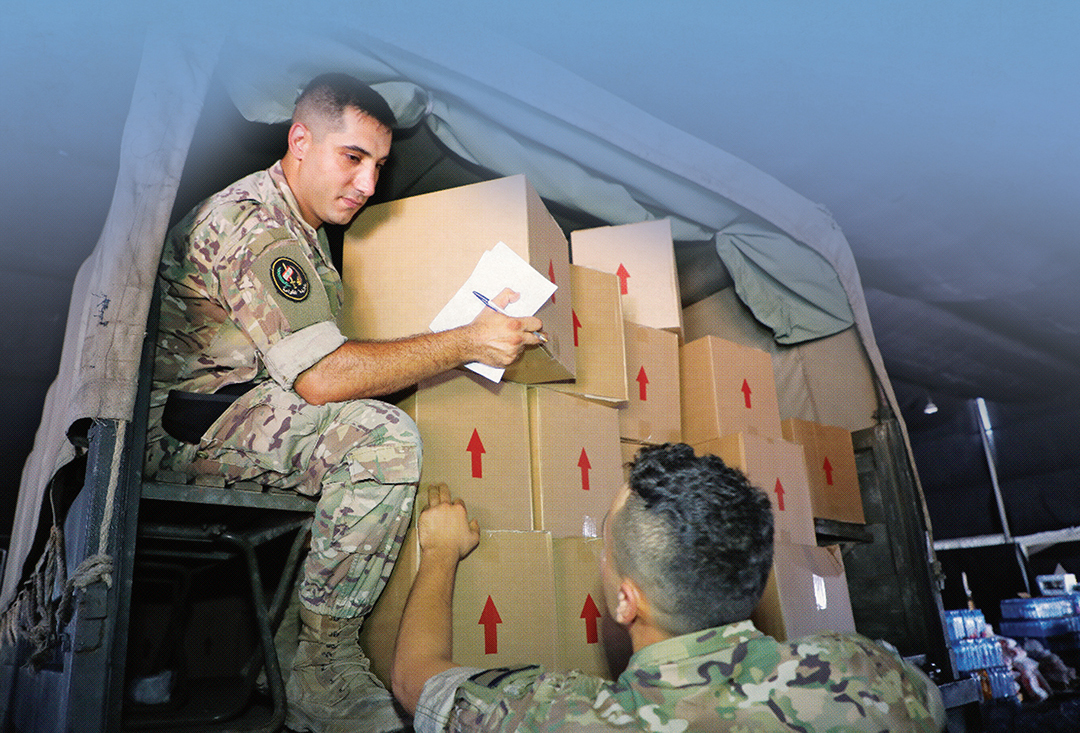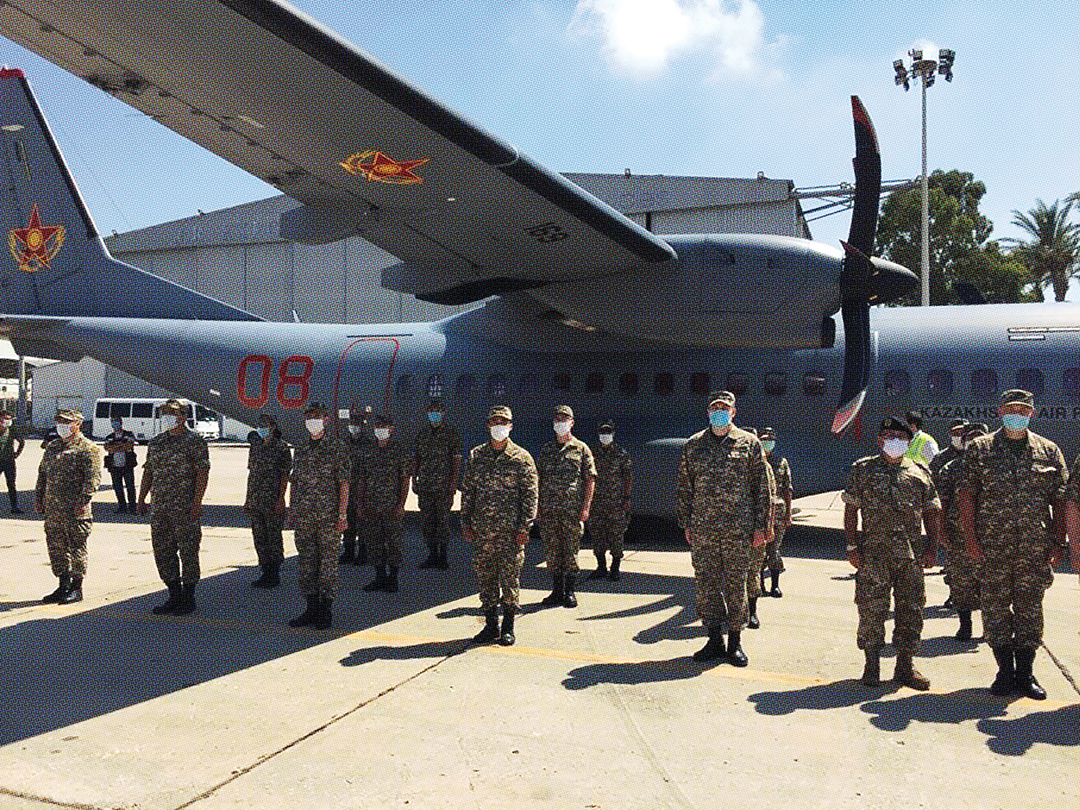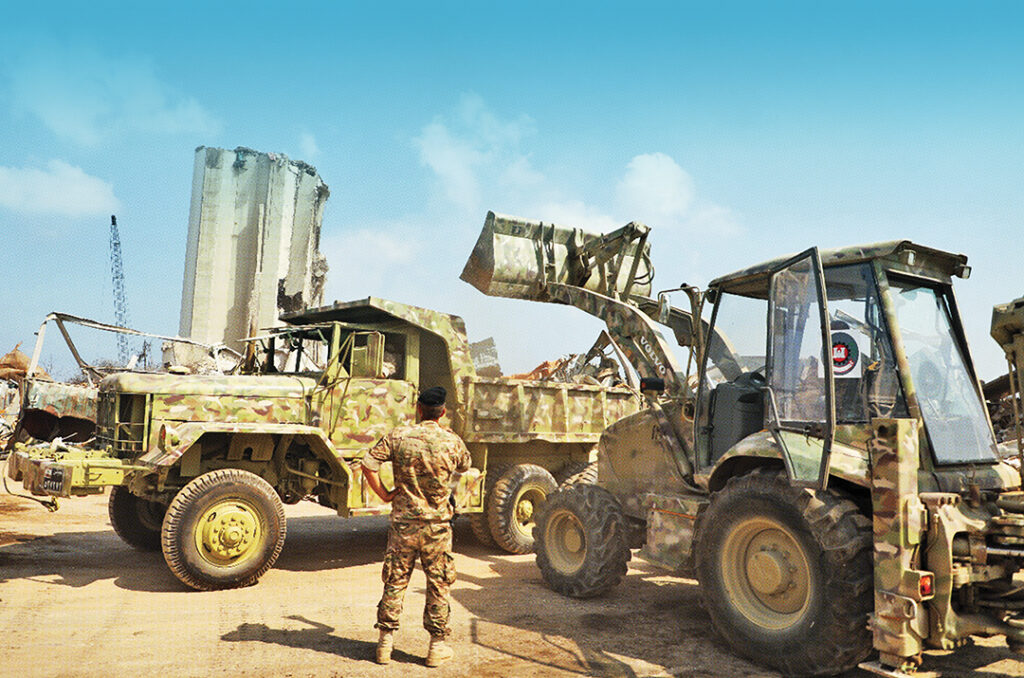At approximately 6:10 p.m. August 4, 2020, a massive explosion in the Port of Beirut rocked the capital and surrounding areas, leaving behind a great number of dead, wounded and missing persons in a matter of seconds and destroying an essential part of the port, including the wheat silos. It also caused enormous damage to properties and residential buildings in the port’s vicinity (within a diameter of 7.5 kilometers), some of which collapsed, including historic structures.
Shortly after the explosion, the Lebanese government declared a state of emergency in Beirut, tasked the Lebanese Armed Forces (LAF) with carrying out the resolution’s provisions, and established an investigative committee to determine the causes of the explosion and assign responsibility. Meanwhile, the fallout of the explosion continued to be felt at national and individual levels for months.
Immediate Action
Army Command took steps to absorb the shock and worked with every available resource to pick up the pieces from the terrible disaster. It quickly isolated the area surrounding the site of the explosion to prevent tampering with the crime scene and undertook extensive action to evacuate, aid and ensure immediate assistance for the injured in coordination with first responders from the Lebanese Red Cross and Civil Defense.

At the same time, military personnel deployed to the affected area hurried to open the main roads for ambulances and firetrucks.
The LAF also made extensive use of helicopters to put out fires around the blast site with the support of the Civil Defense and the Fire Brigade, which helped to quickly extinguish and limit the spread of fires in the area.
To help Lebanese troops, U.S. Central Command began airlifts of food, water and medical supplies aboard C-17 aircraft. These flights carrying pallets of humanitarian aid arrived from Al Udeid Air Base in Qatar.
Army Medical Corps
The Army Medical Corps helped evacuate the injured immediately after the explosion, raising its operational readiness to the limits of its capacity. It received injured military and civilian personnel, providing them with first aid. The corps also worked to transfer by ambulance those who could not be received in the Central Military Hospital to other military clinics and civilian hospitals based on the condition of the injured.
In the field, Army Command supplemented its actions with a set of operational measures to organize and accelerate relief work. It identified a new area of operational responsibility called the “isolation sector” that included the port and its immediate surroundings. By doing so, it helped organize and coordinate relief efforts and remove debris. Military units, led by the Engineering Regiment and the Navy, began spot and perimeter surveys and carried out searches for missing persons. The effort involved Lebanese Navy divers and specialized foreign search and rescue teams from 12 countries (Cyprus, the Czech Republic, France, Germany, Greece, Italy, the Netherlands, Poland, Qatar, Russia, Spain and Turkey) totaling 429 individuals, who arrived in Lebanon in the days immediately following the explosion. These teams contributed their expertise and technical capabilities to assist the Army in surveying the area and quickly recovering the remains of victims from under the rubble.

This successful response is due in large part to the professionalism of the Lebanese Army as it divided the area into sections and assigned foreign teams to them based on experience, numbers, equipment and available capabilities. This focused the teams’ energy on appropriate places and reduced time needed for search and rescue. Work to remove rubble and debris, led by the Independent Works Regiment, began immediately with the help of the forces and units operationally deployed on the ground and in cooperation with the friendly armies of the French and Italians as well as the United Nations Interim Force in Lebanon. These actions helped provision the Port of Beirut and aid its return to near-normal operations.
Helping Victims
Friendly countries were quick to help Lebanon by sending a variety of medical and in-kind assistance. Given the great confidence that the international community and the Lebanese people place in the military for its impartiality and transparency, the Army assumed responsibilities for delivery and distribution of aid. In this context, Army Command formed a central committee, with several specialized subcommittees tasked with organizing the process of receiving, storing and packing aid and distributing it to those affected, according to clear and transparent criteria. Work occurred on two parallel tracks:
The medical aid track: The subcommittee on medical affairs, under supervision of the Army Medical Corps, stored aid in private warehouses. The subcommittee also prepared detailed regulations and submitted them to the Central Committee, which, in turn, coordinated with the Ministry of Health through the Ministry of National Defense and distributed the aid to affected hospitals.
The in-kind assistance track: Various types of aid were received by a committee formed for this purpose. It sorted, packed, stored and distributed food rations to affected households. More than 70,000 aid packages had been distributed by end of 2020.
Forward Operating Base
To coordinate relief missions in the aftermath of the explosion, Army Command established an emergency forward operating base to monitor the humanitarian and development situation in the affected area. The Army surveyed the area to avoid neglecting anyone in need, making its telephone numbers and email available to citizens to report property damage. It also established a call center to receive citizens’ complaints, identify their needs and address their concerns.
Additionally, the Army worked in cooperation with the governor of Beirut, the High Relief Commission, the Lebanese Red Cross and international and domestic nongovernmental organizations to ensure alternative and temporary housing for victims whose homes were damaged, as well as coordinate work among civilian agencies to improve management of reconstruction and relief efforts.
Surveying Damage
After determining the extent of damage and destruction — with the majority of people in the affected areas rendered homeless — Army Command accelerated a damage survey to begin reconstruction before winter. It formed a specialized damage survey committee composed of 1,500 members, including officers, noncommissioned officers and enlisted personnel who were joined by volunteer engineers. The committee worked to assess damage and identify affected buildings and, as a result, 55,000 apartments were found to be damaged.
Similarly, the number of damaged businesses totaled 14,848 corporations and 5,251 commercial companies, while 80 buildings were destroyed and eight more were too badly damaged to be fixed. To improve field coordination among the committee’s task forces, each building, home, and apartment surveyed was given an LAF ID serial number to standardize the process and prevent duplication.
The committee also set up a database containing all the building supplies (such as aluminum, wood, soil, gravel, sand, iron, tile, ceramics, paint, hygiene kits) and household furnishings (furniture, electrical appliances, computers, among other items) that need to be secured for victims to rebuild and restore damaged buildings. This data is available to donors wishing to help.
In parallel to those efforts, the committee put together a list of owners of damaged apartments and distributed the first installment of compensation approved by the Lebanese government in a decree signed by the president. It provided for an exceptional allocation in the general budget for the payment of compensation amounting to 100 billion Lebanese pounds. The distribution was carried out according to a specific mechanism that assessed the value of damage in each house. This phase covered 12,400 damaged housing units.
Investigating the Explosion
The Army contributed to the investigation of the causes of the Port of Beirut explosion through the military police, whose initial work centered on gathering evidence from the blast site. The Forensics Department surveyed the crime scene and collected evidence instrumental to uncovering the circumstances of the explosion and put it at the disposal of police investigators. Police began investigations into suspects under the supervision of the relevant court, in accordance with the Lebanese Code of Criminal Procedure and human rights principles.
Military Media
From the day of the explosion, Army Command’s Orientation Directorate kept pace with events via a series of statements and tweets to inform the Lebanese people. Statements and tweets were also used to circulate general guidelines to ensure the safety of citizens and that search and rescue work was not hindered.
The Army organized several news conferences during which officers detailed the disaster, the work being done at the site of the explosion, and the assistance sent by friendly states and how it was distributed to stakeholders. They also gave detailed explanations of how the damage was surveyed, the findings of the survey, and the plan to compensate property owners. The directorate strengthened its cooperation with the media and facilitated the work of local and foreign journalists, organizing field trips for them inside and outside the explosion site so they could convey information to the Lebanese people and the international public.
Despite the suffocating economic crisis that has affected LAF members in the same way that it has affected the rest of the Lebanese, and despite the coronavirus pandemic that threatens their lives and those of their loved ones, the LAF continues to carry out tasks entrusted to it and aims to perform its duty to the fullest.
Kazakh Military Doctors Aid Lebanese Disaster Victims
ARMED FORCES OF THE REPUBLIC OF KAZAKHSTAN
Just days after the port explosion in Beirut in early August 2020, a team of military medical specialists from Kazakhstan rushed to Lebanon to help disaster victims.
Kazakh physicians and nurses received 635 patients during a two-week stay at hospitals in the cities of Beirut, Bouar and Saida. Surgeons from Kazakhstan assisted with 73 operations, including repairing the shattered leg of a 90-year-old Lebanese man hurt in the explosion.
“I am from South Lebanon. I live in Beirut. At this difficult time for us, I would like to express my gratitude to the leadership of Kazakhstan and military doctors for helping my people and children. Welcome to Lebanon,” said Fadi Ehriya, one of the patients helped by the Kazakh medical team.

The Kazakh response to the Beirut disaster was exemplary. On August 7, three days after the port explosion, President Kassym-Jomart Tokayev summoned Minister of Defense Lt. Gen. Nurlan Yermekbayev and ordered the team to Lebanon. The doctors departed the next day, flying from Aktau to Beirut.
In light of the COVID-19 pandemic, Kazakh authorities barred infectious disease doctors and therapists from traveling abroad. The medical team affiliated with Kazakh Special Forces consisted of surgeons, traumatologists, neurosurgeons, anesthesiologist-resuscitators and nurses. Most of the Kazakhs spoke English. The military flight also carried medical supplies and equipment.
The Kazakhs were welcomed at Beirut’s international airport by Lebanese Armed Forces Brig. Gen. Abi Karam and Ali Dirani of the Lebanese Ministry of Foreign Affairs. It was the start of two weeks of close collaboration between Kazakh and Lebanese medical staff.
“In the course of work in the military hospital and municipal hospitals, we gained good experience,” said Col. Askar Marufov, the lead surgeon from Kazakhstan.
Before their departure, Kazakh doctors met with Lebanese Gen. George Youssef, head of the Main Military Medical Directorate, and Gen. Abudahir Nasim, head of the Military Hospital Beirut. Both sides discussed possibilities for further cooperation in military medicine.
Even before the port explosion, Kazakh troops had gained familiarity with Lebanon as peacekeepers attached to the United Nations Interim Force in Lebanon, or UNIFIL.

